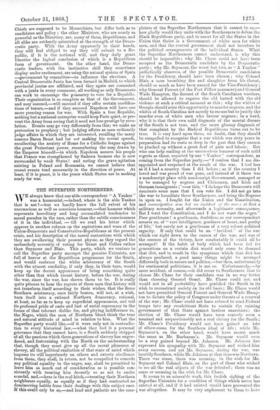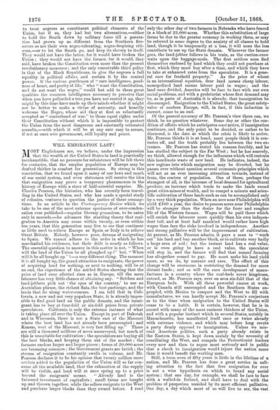THE SUPERFINE NORriaiRNERS.
WE always knew that our able correspondent "A Yankee" was a humourist,—indeed, where is the able Yankee that is not ?—but we hardly knew the full extent of his unconscious as well as conscious humour,—that humour which represents hereditary and long accumulated tendencies to moral paradox in the race, rather than the subtle consciousness of it in the individual, — till we read his letter which appears in another column on the aspirations and woes of the Union-Democrats and Conservative-Republicans at the present crisis, and his description of the moral contortions with which they are swallowing their present physic, as they regard the melancholy necessity of voting for Grant and Colfax rather than Seymour and Blair. This party, which we venture to call the Superfine party amongst the genuine Unionists, are full of horror at the Republican programme for the South, and would embrace the white aristocracy of the South with the utmost cordiality, if only they, in their turn, would keep up the decent appearance of being something quite other than that which recent history, before the war, during the war, since the war, has shown them to be. It is really quite piteous to hear the regrets of these men that history will not transform itself according to their wishes, that the fierce Southern aristocracy, once fairly beaten, will not, at a wish, turn itself into a rational Northern democracy, rational, at least, so far as to keep up superficial appearances, and veil its profound pride of caste and last of social supremacy in the forms of that tolerant dislike for, and pitying indifference to, the Negro, which the men of Northern blood think the true and natural attitude of mind in relation to him. What the Superfine party would like,—if it were only not in contradic- tion to every historical law,—what they feel it a personal grievance that they cannot have, is a South suddenly stripped of all the passions which three generations of slavery has engen- dered, and fraternizing with the North on the understanding that, though they must give up all the moral pleasures of slavery, all the political exaltation of that state of mind which imposes its will imperiously on others and extorts obedience from them, they shall, in return, not be compelled to concede any political equality to the negro, nay, shall be permitted to leave him as much out of consideration as is possible con- sistently with treating him decently so as not to excite scandal, and,—here is the real hitch,—treating their Northern neighbours equally, as equally as if they had contracted no domineering habits from their dealings with this subject race. If this could only be so,—and loud and pathetic are the com- plaints of the Superfine Northerners that it cannot be so,— how gladly would they unite with the Southerners to defeat the Black Republican party, and to assert for all the States in the Union that theirs is a Government of white men for white men, and that the central government shall not interfere in the political arrangements of the individual States. What the Superfine Northerners cannot understand, is why this should be impossible ; why Mr. Chase could not have been accepted as the Democratic candidate by the Democratic party ; why Mr. Seymour, the worst but two, as "A Yankee" pathetically observes, of the possible Democratic candidates for the Presidency, should have been chosen ; why Colonel Blair, a man breathing fire and slaughter from his throat, should so much as have been named for the Vice-Presidency ; why General Forrest (of the Fort Pillow massacre) and General Wade Hampton, the fiercest of the South Carolinian warriors, should be allowed to express the old hatred with the old violence at such a critical moment as this ; why the whites of Georgia should seize this opportunity to murder negroes, and the whites of South Carolina not merely to excuse but to justify the murder even of white men who favour negroes ; in a word, why it is that their own mild diagnosis of the mortal disease of the South is not true, and the more gloomy diagnosis of that complaint by the Radical Republicans turns out to be true. It is very hard upon them, no doubt, that they should be compelled to recognize that a war which was sixty years in preparation had its roots so deep in the past that they cannot be plucked up without a great deal of pain and labour. But who can help smiling at the unconseieus humour of such mild regrets as these, reported by our " Yankee " correspondent, as coming from the Superfine party,—" I confess that I am dis- appointed and surprised at the result of the war. I feel less as if I had a country than I did before ; as if the country I loved and was proud of was gone, and instead of it there was a nondescript place with nondescript Government, managed or to be managed by negroes and Chinamen, and Irish and German immigrants ;"—or this, "I do hope the Democrats will nominate some man that I can vote for. I did not go into the war to humiliate these Southerners, and bring the Negroes in upon us. I fought for the Union and the Constitution, and emancipation was but an incident qf the war ; at first a military necessity, and afterwards a legitimate consequence. But I want the Constitution, and I do not want the negro." Poor gentleman a gentleman, doubtless, as our correspondent assures us, of "rare intelligence, goodness of heart, and purity of life," but surely not a gentleman of a very robust political sagacity. If only that could be an " incident " of the war which cut right down to the causes of the war, and was of the essence of the victory, how comfortably it could all be arranged ! If the habit of body which had been fed for generations on a certain diet would only cease to demand that diet, and to result in the symptoms which that diet has always produced, a good many things might be arranged differently both in nature and polities,—but then, unfortunately for sentimental politicians, it is not so. Unfortunately,—by mere accident, of course,—it did occur to Southerners that to choose Mr. Chase for their candidate was in no way better than choosing General Grant. Mr. Chase could not and would not in all probability have gratified the South in its wish to reconstruct society on its old basis ; Mr. Chase would not have permitted General Forrest and General Wade Hamp- ton to dictate the policy of Congress under threats of a renewal of the war ; Mr. Chase could not have refused to send Federal troops into any recalcitrant State to sustain the existing government of that State against lawless anarchists ; the election of Mr. Chase would have been scarcely even a nominal and unquestionably not a real victory for the South ; Mr. Chase's Presidency would not have gained an iota of elbow-room for the Southern ideal of life ; while Mr. Seymour's, on the other hand, would have meant much the same as Mr. Buchanan's. Mr. Seymour would even be a step gained beyond Mr. Johnson. Mr. Johnson has expressed his sympathy with Mr. Seymour and wished him every success, and yet Mr. Seymour, during the war, was heartily Southern, while Mr. Johnson at that time was Northern. There was sense, there was meaning, in the wish for Mr. Seymour and Colonel Blair, on the part of those who wished to see all the real objects of the war defeated ; there was no sense or meaning in the wish for Mr. Chase.
It seems to us miserable work, this foolish sighing of the Superfine Unionists for a condition of things which never has existed at all, and if it had existed would have prevented the war altogether. It may be very unpleasant to them to have to treat negroes as constituent political elements of the Union, but if so, they had but two alternatives,—either to hold the South down by military force till a genera- tion had grown up as different from the Southern fire- eaters as are their own negro-tolerating, negro-despising citi- zens,—or to let the South go, and keep its slavery to itself. They would not have the latter, for it would have broken the Union ; they would not have the former, for it would, they said, have broken the Constitution even more than the present revolutionary measures ; and the only conceivable third policy is that of the Black Republicans, to give the negroes a full equality in political affairs, and sustain it by the central power. If the various gentlemen of "rare intelligence, good- ness of heart, and purity of life," who "want the Constitution, and do not want the negro," would but add to these great qualities the common intelligence necessary to perceive that when you have pollarded a tree you have not rooted it up, they might by this time have made up their minds whether it might not be better to make a virtue of necessity, and heartily welcome the Negro, whose aid they at first so reluctantly accepted as "contraband of war," to those equal rights under their Constitution without which it is impossible to protect the Union from the most dangerous and constantly reiterated assaults,—with which it will be at any rate easy to secure, if not at once wise government, still loyalty and peace.































 Previous page
Previous page